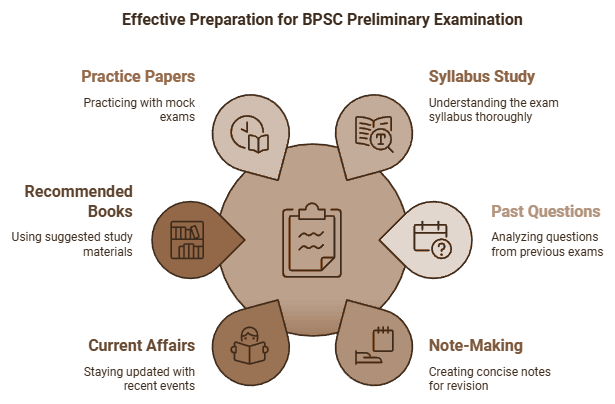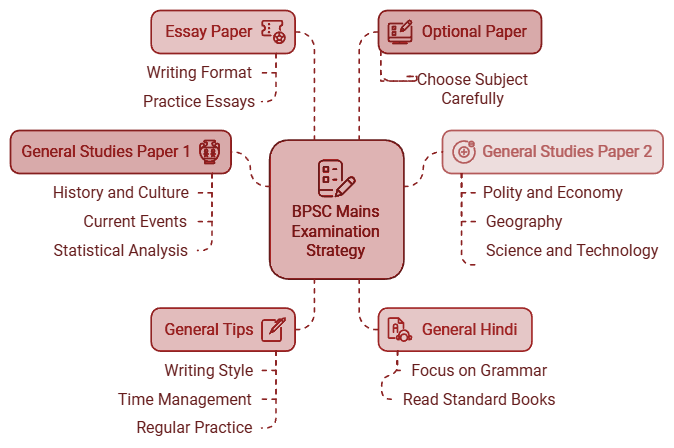Bihar Public Service Commission - Strategy | 20 Dec 2024
To achieve success in the Bihar Public Service Commission (BPSC) Combined Competitive Examination (CCE) examination, it is crucial to devise a well-structured and dynamic strategy aligned with the specific requirements of the examination. This serves as the foundational step, contributing significantly to your success.
The BPSC CCE examination typically consists of three stages: Preliminary, Main, and Interview. Progressing to the next stage is contingent upon clearing the previous one. As each stage has a distinct nature, it is essential to formulate separate strategies tailored to the demands of each phase to ensure success.
Strategy for Preliminary Examination
- Understand the Syllabus: Study the syllabus thoroughly, covering all aspects.
- Prioritise topics based on demand and relevance for the exam.
- Cover topics like History, Geography, Polity, Economy, General Science, Mathematics, Bihar State Special, and Current Affairs.
- Focus on General Mental Ability by categorising and practicing past questions.
- Analyze Previous Year Questions: Review questions from the last 5–10 years.
- Focus on frequently asked topics and recurring patterns.
- Pay special attention to objective-type questions, as they are the primary format for this exam.
- Role of Short Notes:
- Prepare concise notes on factual information, such as the 25 parts of the Indian Constitution. Revise regularly to retain key details.
- Study Bihar-specific content, including its historical events, role in the freedom struggle, and geographic details.
- Focus on Conceptual and Factual Knowledge:
- Develop a deep understanding of concepts and facts for critical sections of the syllabus.
- Example: Understand key facts like "Who founded the Mauryan dynasty?" or "Which river is known as the Sorrow of Bihar?".
- Relevant Study Resources:
- Use recommended materials like Quick Book on General Science and
- Technology by Drishti IAS for science-based topics.
- Follow current affairs on the Drishti website and read the monthly magazine Drishti Current Affairs Today.
- Refer to the India Year Book by the Publication Division (GOI) for institutional topics.
- Practice Mock Papers:
- Solve practice papers and past exam questions within the two-hour time limit.
- Focus on improving subject understanding and identifying repetitive questions to increase accuracy.
Strategy for Mains Examination
The Mains exam differs significantly from the Preliminary exam due to its descriptive nature. Since the marks obtained in the Mains are added to the final merit list, this stage is critical for success. Below is a structured strategy for each component of the Mains examination.
General Hindi (Qualifying Paper)
- Importance: Candidates must score at least 30% to qualify. Failing this will result in disqualification from the remaining paper evaluations.
- Preparation Tips:
- Focus on Hindi grammar (prefixes, suffixes, antonyms, etc.), concise summaries, and comprehension of unread passages.
- Study standard books such as those by Vasudev Nandan and Hardev Bahri.
- Regularly practice writing to enhance proficiency in Hindi.
General Studies Paper 1
- Syllabus Focus:
- Modern History of India and Indian Culture.
- Current Events of National and International Importance.
- Statistical Analysis, Drawing, and Illustration.
- Preparation Tips:
- For Modern History and Indian Culture, relate topics to Bihar’s context.
- Frequently asked topics:
- Role of Bihar in the Revolt of 1857.
- Champaran Satyagraha, Santhal Rebellion, Munda Rebellion, Quit India Movement.
- Frequently asked topics:
- Follow the Prelims strategy for Current Events and tailor it to include Bihar’s relevance.
- Use NCERT books for Statistical Analysis and practice previous year's questions to enhance drawings and illustrations.
- For Modern History and Indian Culture, relate topics to Bihar’s context.
General Studies Paper 2
- Syllabus Focus:
- Indian Polity and Indian Economy.
- Geography of India.
- Role and Impact of Science and Technology in India’s Development.
- Preparation Tips:
- Emphasize Bihar-specific topics for all sections.
- Practice applied questions such as:
- "Critically examine the utility of remote sensing satellites in the context of India."
- "What is 4G/5G technology, and how is it used in daily life?"
- Develop conceptual clarity and focus on real-world applications of the syllabus topics.
Essay Paper
- Importance: A high score in the essay paper can significantly improve overall ranking.
- Preparation Tips:
- Write logically structured essays with the following format:
- Introduction: Capture attention and state the thesis.
- Body: Develop arguments with supporting evidence.
- Conclusion: Summarise key points and restate the thesis.
- Regularly practice writing essays on diverse topics from previous years.
- Refer to Drishti IAS Mains Select Essays for guidance on tone, style, and format.
- Write logically structured essays with the following format:
Optional Paper (Qualifying Paper)
- Nature:
- MCQ-based, with marks not added to the merit list.
- Preparation Tips:
- Choose an optional subject based on your interest, academic background, and overlap with the General Studies syllabus.
- Ensure availability of resources, scoring potential, and manageable syllabus size.
- Review past question papers and seek feedback from toppers to make an informed decision.
- Adopt a strategy similar to the Preliminary exam to prepare for optional subjects effectively.
- Choose an optional subject based on your interest, academic background, and overlap with the General Studies syllabus.
General Tips for Descriptive Papers
- Writing Style:
- Ensure clarity, precision, and logical flow in answers.
- Adhere to the word limit and maintain coherence.
- Time Management:
- Practice completing mock papers within the allotted time to develop speed and accuracy.
- Regular Practice:
- Consistency in writing comes with regular practice and a thorough understanding of the subject.
Strategy for the Interview
- Know Your DAF and Current Affairs: Be familiar with all details in your Detailed Application Form (DAF), including academic background and hobbies. Stay updated on national and Bihar-specific current affairs.
- Revise Core Subjects: Prepare for questions related to your academic subjects, optional paper, and General Studies. Focus on clarity and concise answers.
- Understand Bihar's History and Culture: Study Bihar's historical movements, cultural heritage, and recent developments, as they are often the focus of interview questions.
- Practice Communication Skills: Work on articulation, body language, and maintaining a confident yet respectful tone. Mock interviews conducted by various institutions like DRISHTI IAS can help reduce nervousness.
- Stay Calm and Ethical: Maintain composure during the interview, admit if you don’t know an answer, and ensure your responses reflect ethical and public service values.
Success in the BPSC CCE examination requires a combination of smart planning, consistent effort, and adaptability. By thoroughly understanding the syllabus, leveraging the right resources, and practicing diligently, aspirants can navigate each stage effectively. Staying focused, confident, and committed to their preparation will enable candidates to achieve their goals and excel in this prestigious examination


